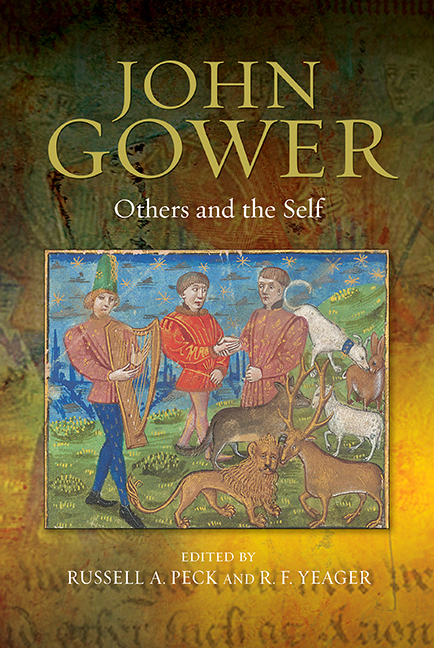Book contents
- Frontmatter
- Contents
- List of Illustrations
- Abbreviations
- Introduction
- PART I KNOWING THE SELF AND OTHERS
- PART II THE ESSENCE OF STRANGERS
- PART III SOCIAL ETHICS, ETHICAL POETICS
- 11 Gower's Governmentality: Revisiting John Gower as a Constitutional Thinker and Regiminal Writer
- 12 Gower's Speculum Iudicis: Judicial Corruption in Book VI of the Vox Clamantis
- 13 “The Lucre of Marchandie”: Poet, Patron, and Payment in Gower's Confessio Amantis
- 14 Hidden Matter in John Gower's Confessio Amantis
- 15 Writing the Cinkante Balades
- 16 Gower in Early Modern Spanish Libraries: The Missing Link
- Bibliography
- Index
- VOLUMES ALREADY PUBLISHED
15 - Writing the Cinkante Balades
from PART III - SOCIAL ETHICS, ETHICAL POETICS
Published online by Cambridge University Press: 30 April 2019
- Frontmatter
- Contents
- List of Illustrations
- Abbreviations
- Introduction
- PART I KNOWING THE SELF AND OTHERS
- PART II THE ESSENCE OF STRANGERS
- PART III SOCIAL ETHICS, ETHICAL POETICS
- 11 Gower's Governmentality: Revisiting John Gower as a Constitutional Thinker and Regiminal Writer
- 12 Gower's Speculum Iudicis: Judicial Corruption in Book VI of the Vox Clamantis
- 13 “The Lucre of Marchandie”: Poet, Patron, and Payment in Gower's Confessio Amantis
- 14 Hidden Matter in John Gower's Confessio Amantis
- 15 Writing the Cinkante Balades
- 16 Gower in Early Modern Spanish Libraries: The Missing Link
- Bibliography
- Index
- VOLUMES ALREADY PUBLISHED
Summary
Both the title and the contents of Gower's Cinkante Balades firmly situate the work in the dominant strand of the French courtly lyric of the fourteenth and early fifteenth centuries, as it was practiced and defined by the major poets of the era—Machaut, Deschamps, and Froissart—and as it was sustained by their many followers, including, among Gower's contemporaries, Oton de Granson, who spent much of his career in England; Christine de Pizan, who may have begun writing ballades at about the same time as Gower; the aristocratic poets who contributed to the Livre des cent balades, to whose work Gower probably makes a bow in his choice of the round number cinkante; and also many anonymous writers, such as the poets whose works appear alongside those of their better-known peers in the Pennsylvania chansonnier, which was copied at just about the same time as the manuscript in which the Cinkante Balades is contained. Gower's relation to this tradition is complex. While he clearly adopted many of the most recognizable conventions of form, diction, and theme, he equally clearly made his own choices, some with an eye to the design of his collection as a whole, some as part of an ongoing dialogue with the poets whose works he knew, and some because of his own understanding of the expressive function of the lyric. There is a great deal of variety in the Cinkante Balades for anyone who reads them closely, but because of the choices that Gower made, the work also has some distinctive qualities that set it apart from every earlier collection of ballades.
The date and the order of composition of the poems that now make up the Cinkante Balades must remain unknown, but there is evidence that, like the contents of the manuscript in which they appear, their present arrangement is the result of at least some effort to give shape and order to the collection. The ordering is particularly evident at the end. The last four poems (48–51) switch from personal address to more general reflections on the nature of love, the last three in the voice of the poet, and the last of these turns to a different sort of love entirely as the poet speaks of his affection for the Blessed Virgin in what was clearly intended as the conclusion.
- Type
- Chapter
- Information
- John Gower: Others and the Self , pp. 306 - 328Publisher: Boydell & BrewerPrint publication year: 2017

